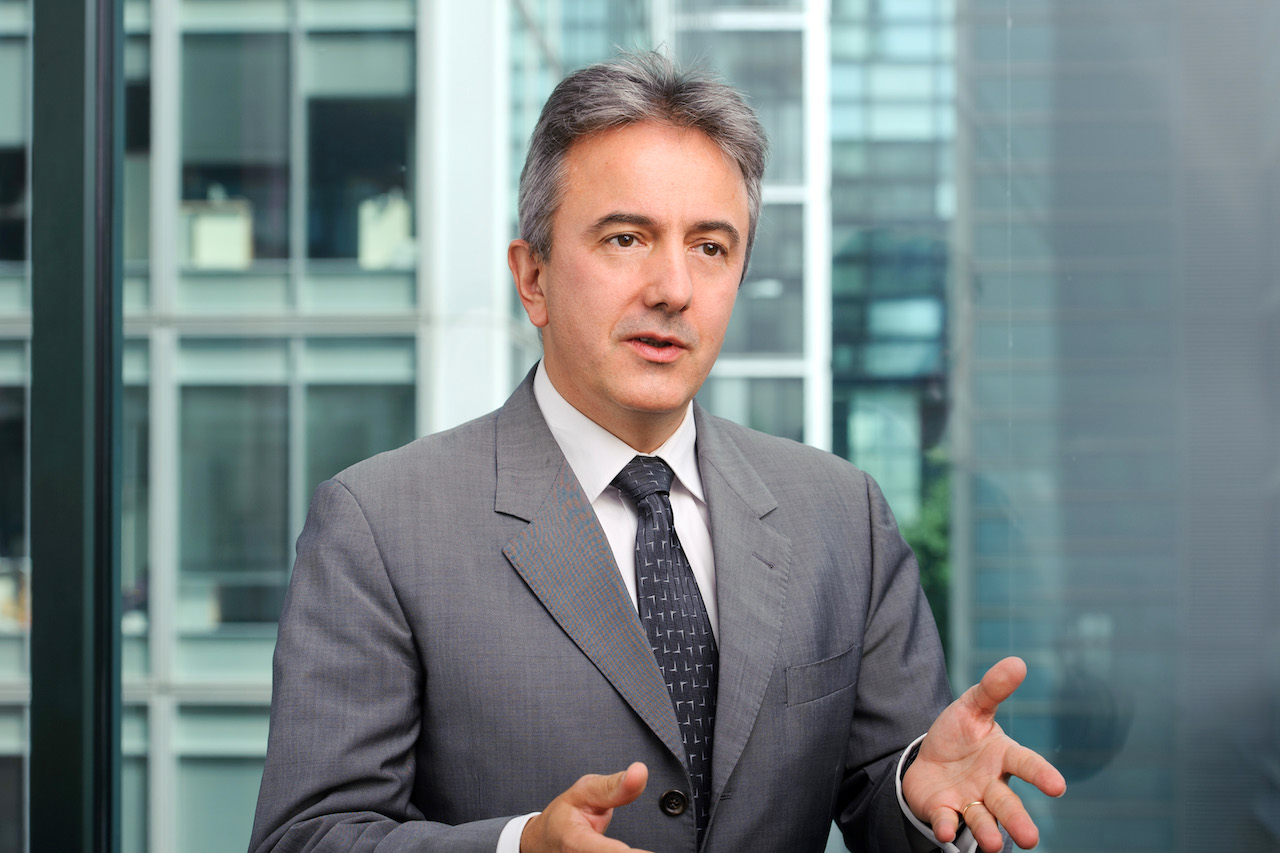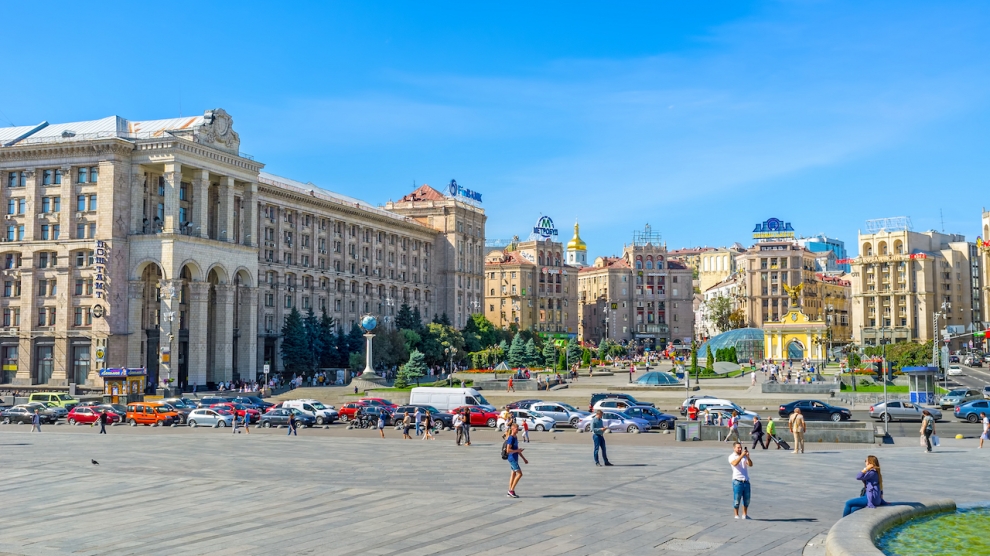Until now, the European Bank for Reconstruction and Development (EBRD) has invested over € 21 billion in more than 1,000 projects across six countries of Eastern Europe and the Caucasus (EEC), contributing to the countries’ economic growth as well as policy dialogue.
Francis Malige, Managing Director for Eastern Europe and the Caucasus for the European Bank for Reconstruction and Development (EBRD), spoke to Andrew Wrobel about the prospects for growth in Armenia, Azerbaijan, Belarus, Ukraine, Georgia and Moldova, which make up the Bank’s EEC region, as well as the business climate and investment opportunities in its largest economy — Ukraine.
How do you see the prospects for growth in Eastern Europe and the Caucasus?
Well, it is a region that has suffered from economic, and sometimes political, shocks over the past couple of years. The drop in the price of oil, the recession in Russia and the uncertainty linked to the political situation have had an impact on its growth, investments and remittances.
If we look at the EEC countries, however, they have all reacted in different ways. Some of them are also impacted when the harvest is not as good as planned or even not as good as the year before, for example, Moldova. Recently, Azerbaijan has been impacted by the drop in the price of oil. Belarus, despite being a non-oil producing country, is also hit when the price of oil goes down because one of its major sources of export revenue is the refining of the oil that it gets from Russia at a fixed price. Once refined, it is exported elsewhere at market prices, but this margin is being compressed now.
Georgia has been an outsider there, managing to handle all the crises relatively well. They saw some drop in the GDP between 2014 and 2015, and their currency was devalued by 28 per cent. At the same time, compared to what we saw for the Russian or the Belarusian rouble, the Azerbaijani manat (which is in a free-floating mode as of mid-January) and the Ukrainian hryvnia have been rather well-managed and we are seeing a resumption of growth, both in 2016 and 2017. We expect Georgia to have the highest GDP growth in the region.

If we look at the region, I believe, the countries’ representatives would say their strategic location is one of their key assets. Is it?
Certainly, but it is a region which has a lot to offer, in terms of the potential. But you’re right, each of these countries likes to think that it has a strategic location, and to some extent, 100 per cent of the world’s countries have a strategic location.
However, these six countries are in the middle of the new Silk Route. Clearly this applies to Azerbaijan and Georgia. Armenia also stands to benefit from the opening of the Iranian economy, even though it’s in a landlocked situation. Of course, Ukraine is a key transit country for gas and oil. In addition, if there has to be one branch of the Silk Route that follows the road through the Caucasus and eventually goes north to the Baltics and to the Scandinavian countries, that would logically go straight through Ukraine.
Moldova is in a rather more difficult position from that standpoint because the east-west route is not as easy to take, mainly because you need to go through Transnistria, and frankly, on the north-south route there are other, better, ways to travel than going through the country.
Then, Belarus is a doorway to the Russian market. It is one of those places where, in current circumstances, it’s easier and more practical to do business than in Russia. At the same time, it allows people to get into the Russian market and it’s where you’ll find a very well-educated population at a comparatively low cost, so it’s a favourable investment location.
If you keep believing in free trade which, of course, these days is a bigger challenge than a year or two ago, Belarus is a good place to invest and to re-export. Belarus and Armenia benefit from access to the Customs Union market. Ukraine, Moldova, and Georgia, in their turn, benefit from the tariff-free access to the EU market.
The European Bank for Reconstruction and Development has been very active in the region, hasn’t it?
Yes, these are places where we have invested between €1.6 billion and €2.2 billion every year for the past two or three years. In Ukraine alone, we’ve invested €12 billion since 1993. Across the region, it’s more than €21 billion, over the past 25 years. So, we are the largest financial investor in any of these countries.
All of them, of course, are shareholders in the bank, so that creates a close relationship between the authorities and the Bank, and that positions us quite well to manage both the policy dialogue as well as the investment, meaning we can influence the way in which we contribute to the countries’ changes.
Our priority is to support private initiative and investors of different sizes across the region. At the same time we also finance sovereign and municipal projects that are aimed at the improvement of the key infrastructure which is vital for the development of the private sector in all the countries.
In the beginning of our discussion, you mentioned political changes taking place in the region. How do you see the political stability in the region impacting the region’s potential?
I mean we see a lot of declarations. I still believe that common sense will work in the end, meaning that free trade is beneficial for all these countries. It is beneficial for the EU and it is beneficial for everyone involved.
What we probably need to understand is that, inside these countries, the reason people criticise trade is mostly because the benefits of that trade have not been shared internally. More effort is required to make sure that the benefits of growth are not just going to the top one per cent and that there’s more inclusion in the entirety of growth. So, I guess that’s the difficult part, because frankly, we’ve not been very good at it.
If you look at the recent developments in Europe and the US: the Brexit referendum or the elections in the US, what is the impact of these developments on the region?
We see a slightly negative impact. A modern economy in any given country is better off when it’s integrated into other economies rather than when it’s built on a standalone basis, for reasons of the spread of innovation, better competition, and so on. However, integration is also a political process. We’ve never seen an example where any country has succeeded in isolation. This simply doesn’t work.
Talking about integration, how can Ukraine’s integration help the country develop?
Firstly, the relationship between countries is the country’s business, (not the EBRD’s), so it’s their choice whom they want to be friends with. Secondly, I think what we see is that, of course, the EU is a very large market and if a country chooses to bring itself closer to the EU standards, it will probably make it easier for its companies to develop, design, and sell products to the EU. The EU is still is one of the largest, if not the largest, consumer market in the world.
What Ukrainian businesses do need to realise — and some of them have already realised it extremely well — is that an open market doesn’t mean that clients are waiting with open arms and bunches of flowers for you to appear. In fact, it’s tough to get German and British customers, but feasible. Here’s an example from Ukraine: there is a medium-sized brick manufacturer who supplies the London Underground out of a small factory somewhere not far from Kyiv. I say hats off to them because not only do they have a good product, but they’ve also thought about how to make it good for export and how to convince some of the most prestigious clients in the world to buy their product.
That does sound like an achievement.
Yes, and more companies in Ukraine should emulate this example and go out and conquer the free market, but to do that you need to build up your distribution and your client base. It’s not just good enough to say, “I’ve got this great product. Its description is written in Ukrainian only, but that’s fine because it’s great and it’s cheap.” That’s not necessarily what consumers and distributors want. So, this whole notion is of changing the product specifications, of adapting to the taste of the customers, and then learning to work with the ways of the distribution.
You must also be able to supply more than just one truckload; you need regular truckloads when they are required. The reliability of supplies is becoming a key decision-making factor in the supply chains of today. Additionally, if you want to have Ukrainian products on the shelves of supermarkets outside Ukraine, you need to make sure that corruption in customs, or elsewhere (or other similar factors), doesn’t interrupt the supply.

We know that the EBRD is the biggest investor in the region. If we look at other foreign investors in Ukraine, as I’m talking specifically about Ukraine now, it seems that FDI is desperately needed here. A couple of years ago, a lot of investors fled the country. How do we attract those investors back?
Yes, FDI is desperately needed here but look at Poland and Ukraine as investment destinations, for example. While there is a GDP growth of about one per cent in Ukraine, you cannot even think of catching up with Poland, because Poland is growing faster than this, so the gap is only going to get worse. Naturally, investors will opt for a better developed economy.
The people in Ukraine are going to look to their northern and north-western neighbours with more and more envy and regret, knowing that when the Soviet Union collapsed, the two countries were at about the same level.
But this example shows what it does to an economy if you manage it well, or less well, over a long period. You see a huge divergence in growth and in the path of prosperity. If we want to play a catch-up game, we need to see growth in Ukraine at a pace of between five and ten per cent annually, the latter being a rather optimistic scenario but the former a desired minimum.
This cannot be achieved without significant investments and not without significant foreign investment in particular. Currently, the way to attract foreign investment is not just to build a wonderful kingdom for foreign investors, but to create a level playing field where the rule of law will apply, where you will have no concerns and where there will be an efficient service that treats all issues according to the regulations and so on.
It works so much better if you do this on the national scale rather than in a specifically designated zone where you need a foreign passport to benefit from it. There are also Ukrainian investors and building a better environment for them is also going to bring a lot of benefit to this country.
A proper investment climate for domestic investors will help stimulate foreign investors, because very often what do foreign investors do? They look for partners. Ask yourself if they would prefer to look for partners who have to fight every day for the survival of their business because someone is trying to steal it from them, or do they want to look for happy partners who have the rule of law, who have their property rights preserved and so on? So, building a country — building an environment — where local, private business people can prosper in an honest manner is the best way to attract foreign investors.
So, is it about making local business people’s lives easier and then attracting foreigners?
Yes, and then sharing that experience with others because we can say wonderful things about the investment climate, but they aren‘t going to listen exclusively to businesses operating in the Ukraine.
How do you make these investment decisions? I’ve been on the other side making investment decisions for a private company. Firstly, you look at the market. Does the market look as if it is working reasonably well? If not, you have a problem. What you do then is you start exporting into that market, which means finding an agent, finding a retailer and finding a dealer to sell your product. So, the first step in establishing your presence is to start exporting there or to start finding suppliers to import from there.
After that, you ask how I should integrate this. These guys make a great product. It’s really cheap. It’s much cheaper that what I could do in-house. How about I buy them or I create a partnership with them? That’s FDI, but attracting dozens, even hundreds of small investors into the country, of either local investors or foreign investors, requires building a good business environment.
It seems that the discussion about the business climate or corruption, for example, has been going on for ages. It also seems that people know about it, but still not much has been achieved. What’s your opinion on that?
Well, as long as it doesn’t change, I don’t expect foreign investment to come in any meaningful way. More people in Ukraine have to understand this. Some of the people that don’t understand this are the people that need to understand this the most.

